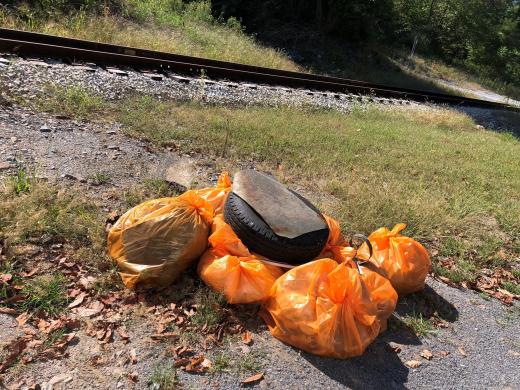Conservation
New River Valley Chapter of Trout Unlimited’s Conservation Initiatives
Our conservation goals dovetail Trout Unlimited’s mission to support and enhance the cold water habitats, waterways, and aquatic life in NRV ecosystems. Our chapter activities focus as trout advocates for this 4 county region and the land and water where we live.
Past and On Going Programs:
Stream Protection:
Big Stony Creek (Giles Co.) monthly water quality monitoring & posting.
River Trash Removal and Stream-side improvements - semi-annually
Tree Planting on River Banks and other erosion control measures Initiatives
Assisting regional US Forest Service with waterway barrier and culvert evaluations
Volunteer services to Virginia DGIF fisheries regional personnel
Gas pipeline construction monitoring and potential degradation of area streams
National TU and Community Outreach
Active membership in the NRV Watershed Advisory Board (Roundtable)
Regional representation for TU to VA Department of Environment Quality
Special interest local Clubs and Associations presentations of our TU mission
Investigate and report pollution, stream degrading, and habitat loss concerns
Stream Monitoring: Scientific water quality measurements are made monthly on Big Stoney Creek and Sinking Creek (Giles County). Our monitoring of Little Stony Creek has ended with the USGS placing a full time electronic stream analysis transmitter on this key brook trout stream.
TU and West Virginia Rivers Org. have partnered to monitor all specific stream sites where the Mountain Valley Pipeline (MVP) and Atlantic Coast Pipeline crosses waterways. Our NRVTU chapter regularly monitors Big Stony Creek in 2 locations, before and after the proposed pipeline MVP crossing. Pipeline construction activities have halted for the time being. The Corps of Army Engineers is requiring new and improved environmental assessments with associated permitting applications for enhanced crossing precautions, protocols and techniques. Also several lawsuits are still in litigation concerning same. Weekly stream monitoring and reporting to central organizations will start when the pipeline resumes construction.
Stream Barrier Assessments: Our NRVTU Chapter supported a pilot program with TU and the US Forrest Service assessing Culverts and other possible stream barriers within the Jefferson and George Washington National Forrests. Two teams of volunteers from the Roanoke and NRV TU Chapters and Virginia Tech, surveyed and reported on over 70 culverts, photographed and surveyed specific pipe and water passage conditions. With our guidance and reports, further enhancements to this important new initiative should be forthcoming.
Mountain Valley Pipeline Update:
- Roanoke Times Mountain Valley Pipeline 2/14/2020

